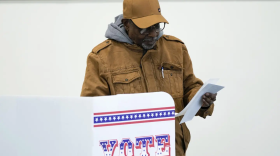Detroit’s mayoral race is heating up as the August 5th primary approaches — and last week four of the eleven candidates in the running participated in a debate.
Briana Rice is a civic life reporter at Outlier Media in Detroit and she’s been following the mayor’s race closely. She joined Michigan Public's Morning Edition producer Caoilinn Goss for an update.
Caoilinn Goss: Since you last joined Morning Edition to talk to Doug Tribou about the race, two write-in candidates have joined the already competitive field. You and the team at Outlier Media talked to all 11 candidates, and you asked them each the same 25 questions. What were some of the questions and how did you decide which ones made the list?
Briana Rice: Yeah, this has been such a fun process that you can totally take. It's our "Meet Your Mayor" quiz. But basically, we commissioned the University of Michigan to survey 2000 Detroit residents who told us some of their biggest concerns. So the goal with this quiz was to really find out what people would prioritize. Like who should respond to mental health calls? Who's most responsible for a lot of the things happening in the city? Should we protect immigrants from federal enforcement? Questions like that, that I think they're not getting asked all the time. I was hoping to force them to make some tough choices.
CG: Were there any answers that stood out or surprised you?
BR: Oh, there were many. So one of them, we asked if candidates supported Right to Renew. Basically that's the right to renew your lease when it's up -- with some caveats. If you're a bad tenant, there are ways for landlords to get out of it, but it protects tenants who complain about their housing or other things from a landlord retaliating against them. And people are calling for that to happen in Detroit. And every single mayoral candidate said they support it, which was surprising to me. I think I have been surprised by some candidates who said we should protect immigrants from federal enforcement, and some who said we shouldn't. And also just how we approach our affordable housing in the city.
CG: What are some of the biggest differences you've noticed in the candidates approaches to housing?
BR: A lot of how candidates are talking about housing is a path to homeownership. And fixing up, I mean I know anyone who's come through Detroit, there are a lot of houses that need home repair, right? People need new roofs. People need all kinds of things. So I think people are talking about how do we fix up this existing housing stock that we have. How do we get people into those homes? But there's also a need for multi-family, affordable apartment buildings. So it all ties back into getting people into homes and what kind of homes people need.
CG: Were there particular candidates who strongly disagreed on how to approach the problem?
BR: I think that the biggest difference I've seen in the candidates so far is the tax break part of it. How we make decisions about who gets to build the housing and how much money they get for it. I also think there is, the Detroit Land Bank Authority, which owned a lot of the housing stock in the city, and they are not a department of the city government. They're their own agency. So there has been a lot of criticism about how they've kind of gotten people into homes, how they've sold it, and how much housing stock they still have. So I think a big difference here is how candidates see if it just needs more reform to offer more opportunities, if it needs to be completely overhauled, or if it should not exist. I will say no candidate said that the Detroit Land Bank Authority is working as it should be.
CG: Another issue that Detroit voters say is top of mind is transportation. Can you tell us more about what changes residents are looking for and how the candidates plan to address those concerns?
BR: You know, often in Detroit when you're trying to ride the bus, it comes every 40 minutes. So definitely they're talking about increasing frequency to every 15 minutes. We also don't really pay our drivers well in this city. So a lot of the time people will get trained up to drive a bus in Detroit and then go work in the suburbs and make a lot more money. So they're talking about paying drivers more. And also, I know that people want to introduce electric fleets. We're thinking about climate change with transportation, but something I think people would like to see candidates talking about a little bit more is just the expansion of our QLINE. We have this railway already in the city that I hear people talking about wanting to go to Palmer Park or down Jefferson or just a little bit farther than it goes now, or just a train that could connect us to other parts of the state. I know that's a big concern for people who want to stay in Detroit long term.
CG: You've already mentioned that safety is a big issue for folks as well, and the candidates have some pretty stark differences in what the problem is and their approach. Can you tell us more about that?
BR: Yeah, I think one of the questions we asked that has been a big issue across the state is who should be the most responsible for violence intervention? Half the candidates said police. Half said community groups with government funding and then a former police chief who's running for mayor, James Craig, said family and neighbors are the most responsible. So I think they're running the gamut a little bit here. And I also think a big issue is just who should respond to mental health calls? I think it's something we're talking about across the country. For the most part, most candidates said police with trained mental health professionals should be the ones responding to mental health calls. And then two candidates, Jonathan Barlow and Joel Haashiim, said just mental health professionals without police.
CG: Utility and health care costs are also increasing for Detroiters. How are the candidates planning to help the city's residents tackle rising expenses?
BR: Yeah, I think this was definitely a tough one to ask them about because truly, the mayor has no control over that. There's not some ordinance or bill they can pass to fix this for us. But what they can do is be the voice of Detroit, right? They can be an advocate. They can work with Lansing. The city does have some say in our water department, right? Like people are having super high water bills right now and water shutoffs are back in Detroit. And we no longer have an income-based water affordability program. Those are things that a mayor could help get grants for. And we did see many candidates say that they would try to find ways to compel DTE. They would try to figure out grant funding to stop water shutoffs. But only one candidate said they didn't believe in water shutoffs at all. And that was Jonathan Barlow.
CG: Detroit's nonpartisan primary is on August 5th, and the two top vote getters advanced to the general election in November.








